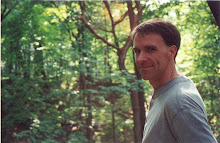 While Hopper was judging an art competition for the Corcoran in February 1951, he was struggling with the flu and his own painting First Row Orchestra, which I headed off to see over at DC's Hirshhorn Museum on the National Mall.
While Hopper was judging an art competition for the Corcoran in February 1951, he was struggling with the flu and his own painting First Row Orchestra, which I headed off to see over at DC's Hirshhorn Museum on the National Mall.
The mall stretches from the Washington Monument at one end, to Capitol Hill
at one end, to Capitol Hill on the other: from the founding of our country and its myth of "I cannot tell a lie" to the modern day ruling class selling to the highest bidder. The large number of ex-military people who work in DC, and the city's emphasis on appearance, make it work-out-obsessed, and the green's sandy paths were overrun with people jogging.
on the other: from the founding of our country and its myth of "I cannot tell a lie" to the modern day ruling class selling to the highest bidder. The large number of ex-military people who work in DC, and the city's emphasis on appearance, make it work-out-obsessed, and the green's sandy paths were overrun with people jogging.
This mall is as close as you get to a public square in this so-called "city," (really a "district"). You might say DC is only "approaching a city." It is not a state; that's for sure. During my visit, I saw people with gear that sported the slogan "taxation without representation." It is an administrative center, where representatives from all other cities come to form a temporary city. John Kennedy called it, "a town of Southern efficiency and Northern charm."
Jeff, a fellow writer and SAS classmate of mine who grew up in the DC area as the son of a diplomat, called it a "transient town." "Hopper and isolation in DC?," he said. "How about Hopper and segregation in DC? It's a very segregated town, with no industrial heart. Industries have traditionally attracted immigrants who build a sense of community, which might serve to counteract the tendency towards isolation. America itself, with its ethic of rugged individualism and independence, seems a breeding ground for isolation. Washington is a place of power, but the job of running our country seems to be a lonely one."
As Jeff noted, the United States's very founding is linked with isolationism: the colonists and ensuing immigrants isolated themselves from their former cultures, towns, families, and homes. This led to further isolation in the new culture, as citizens cocooned themselves in enclaves based on those former cultures, nationalities, and allegiances.
Our history is also full of examples of the "do-it-yourself" ethic and ardent individualists: Henry David Thoreau; John Brown; Jesse James; Mormons; Davidians. Today, we have shore to shore to ourselves and so are neither used to nor good at sharing. We have no welfare system and fewer societal safety nets as each Congress passes. Perhaps what unites us Americans most is exactly our fractionalism.




No comments:
Post a Comment